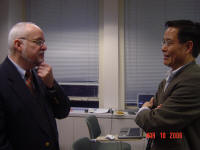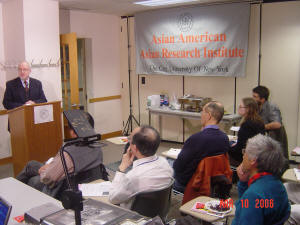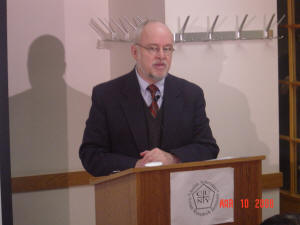In 1996 Sir Geoffrey Lloyd published a comparative study of ancient science east and west: Adversaries and Authorities. Investigations into Ancient Greek and Chinese Science. In this book he argues that Greek science was successful by virtue of its adversarial nature, whereas Chinese science was better described as authoritarian in character. But to what extent does this categorization apply to Chinese mathematics?

This lecture will investigate this question, beginning with a general overview of ancient Chinese mathematics. The earliest yet-known mathematical work in China was only recently discovered in a tomb that can be dated to the early second century BCE. Previously unknown, the 算數書 Suan Shu Shu (A Book on Numbers and Computations) is written on nearly 200 bamboo slips and is unique among mathematical works from ancient China because it survives in a durable form from the time it was written.
The other classic texts of ancient Chinese mathematics like the famous 九章算術 Jiu zhang suan shu (Nine Chapters on the Art of Mathematics) are known only from an imperfect copy printed in the Southern Song dynasty (1213 CE), and from other even later collations and editions. Nevertheless, from these it is possible to reconstruct the state of mathematics in ancient China, and in so doing, counter many of the myths and untenable claims about what was actually the case in ancient China.

For example, it is often said that the Chinese placed little emphasis upon mathematics, and that lacking the Greeks’ penchant for axiomatic treatments with correspondingly rigorous standards of proof, Chinese mathematics was comparatively lacking. Western historians of mathematics have used such terms as “backwardness,” “underdeveloped,” “weak in geometry,” and even “disorganized” to criticize Chinese mathematics. However, to anyone familiar with Chinese texts, these descriptions are difficult to justify.
The 3rd-century CE commentator Liu Hui devised careful arguments and proofs to justify his commentary on the Nine Chapters, and later mathematicians introduced sophisticated techniques that in some cases surpassed western mathematics, especially during the “zenith” of Chinese accomplishments in the Song and Yuan dynasties (960-1368 CE).
This lecture will highlight these developments, focusing in particular on the 十部算經 Shi bu suan jing (Ten Books of Mathematical Classics) and end with an evaluation of not only the character of ancient Chinese mathematics, but an assessment of its major innovations.


